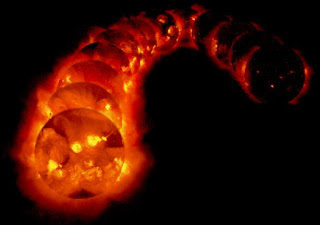GLOBAL WARMING
a Threat to Our Environment
The term "global warming" is a specific example of climate change, which can also refer to global cooling. In common usage, the term refers to recent warming and implies a human influence. The United Nations Framework Convention on Climate Change (UNFCCC) uses the term "climate change" for human-caused change, and "climate variability" for other changes. The term "anthropogenic global warming" is sometimes used when focusing on human-induced changes

CAUSES

A beautiful view of our beloved Earth from space.
The Earth's climate changes in response to external forcing, including variations in its orbit around the Sun (orbital forcing), volcanic eruptions, and atmospheric greenhouse gas concentrations. The detailed causes of the recent warming remain an active field of research, but the scientific consensus is that the increase in atmospheric greenhouse gases due to human activity caused most of the warming observed since the start of the industrial era. This attribution is clearest for the most recent 50 years, for which the most detailed data are available. Some other hypotheses departing from the consensus view have been suggested to explain the temperature increase. One such hypothesis proposes that warming may be the result of variations in solar activity.
GREENHOUSE EFFECT

A schematic representation of the exchanges of energy between outer space, the Earth's atmosphere, and the Earth surface. The ability of the atmosphere to capture and recycle energy emitted by the Earth surface is the defining characteristic of the greenhouse effect.
Existence of the greenhouse effect as such is not disputed. Naturally occurring greenhouse gases have a mean warming effect of about 33 °C (59 °F), without which Earth would be uninhabitable. Rather, the issue is how the strength of the greenhouse effect changes when human activity increases the atmospheric concentrations of some greenhouse gases.
FEEDBACKS EFFECT

One of the most pronounced feedback effects relates to the evaporation of water. Warming by the addition of long-lived greenhouse gases such as CO2 will cause more water to be evaporated into the atmosphere. Since water vapor itself acts as a greenhouse gas, the atmosphere warms further; this warming causes more water vapor to be evaporated, and so on until a new dynamic equilibrium concentration of water vapor is reached with a much larger greenhouse effect than that due to CO2 alone.
SOLAR VARIATION

A different hypothesis is that variations in solar output, possibly amplified by cloud seeding via galactic cosmic rays, may have contributed to recent warming. It suggests magnetic activity of the sun is a crucial factor which deflects cosmic rays that may influence the generation of cloud condensation nuclei and thereby affect the climate.
Remaining scientific uncertainties include the amount of warming expected in the future, and how warming and related changes will vary from region to region around the globe. Most national governments have signed and ratified the Kyoto Protocol aimed at reducing greenhouse gas emissions, but there is ongoing political and public debate worldwide regarding what, if any, action should be taken to reduce or reverse future warming or to adapt to its expected consequences.
Summary from several source :
- Microsoft ® Encarta ® Reference Library
- Wikipedia






































No comments:
Post a Comment